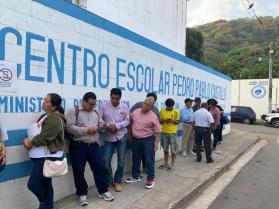El Salvador triumphs over mining company's unjust lawsuit at the World Bank
This article originally appeared in the December 2016 issue of El Salvador Watch
On October 14, the World Bank’s International Centre for the Settlement of Investment Disputes (ICSID) delivered its long-awaited ruling in OceanaGold/Pacific Rim Mining Company's lawsuit against the government of El Salvador. The tribunal found the lawsuit without merit, thus freeing the government of El Salvador from having to pay any of the $250 million in damages sought by the mining company.
This was a major victory, not only for El Salvador but also for communities, movements and governments around the world who are attempting to defend their lands and livelihoods from corporate exploitation.
The Canadian company Pacific Rim filed the lawsuit in 2009 after the government of El Salvador refused to grant gold mining permits in the northern province of Cabañas. The lawsuit made use of the investor-state dispute settlement provisions of the US-Central America Free Trade Agreement (CAFTA) and Salvadoran investment law, both of which allow companies to sue for lost future profits. Pacific Rim was later bought by Australian company OceanaGold.
The government of El Salvador’s decision to not issue permits did not come about on its own. The resistance organized by local communities and their social movement allies was strong enough to pressure the right-wing ARENA administration of Tony Saca not to give PacRim the green light. The subsequent FMLN-led administration of Mauricio Funes went on to declare a moratorium on metallic mining, which current President Salvador Sánchez Cerén has maintained.
According to national polls, approximately 80% of the Salvadoran population supports a ban on metallic mining. The anti-mining movement has continued to push the Legislative Assembly to pass a permanent ban on metallic mining but right-wing legislators have blocked the proposed legislation from advancing.
Throughout the case, CISPES and our partners in the International Allies against Metallic Mining in El Salvador brought this unjust case to light through media attention, Congressional pressure, and creative protests outside the World Bank. Though El Salvador’s legal victory at the ICSID is a cause for celebration, the company’s actions have cost the country and the communities of Cabañas a great deal. First and foremost, four community activists from Cabañas, Marcelo Rivera, Dora Alicia Sorto Recinos, Ramiro Rivera and Juan Francisco Durán Ayala, were killed for their work to keep gold mining out of their communities.
As the International Allies stated in a press release following the ruling, “there are no winners” in this case. El Salvador had to pay more than $12 million in legal costs just to defend itself, which could have paid for two years of adult literacy classes for 140,000 people.
As part of the ruling, OceanaGold was ordered to pay back two-thirds of the legal costs incurred by the Salvadoran government, or $8 million. But it remains to be seen whether or not the mining company will comply. According to CISPES Executive Director Alexis Stoumbelis, “At a minimum, OceanaGold should comply with the ruling and reimburse El Salvador for the costs of this suit. It should also be responsible for the social and environmental damage left in its wake.” The environmental movement has made a public call for OceanaGold, which continues to pursue its interest in opening the El Dorado mine, to depart from the country entirely. Until that day, the International Allies will continue our solidarity. ¡Adelante!

 "I am a CISPES supporter because continuing to fight for social justice and a more people-centered country means continuing the dream and sacrifice of thousands of my fellow Salvadorans who died for that vision.” - Padre Carlos, New York City
"I am a CISPES supporter because continuing to fight for social justice and a more people-centered country means continuing the dream and sacrifice of thousands of my fellow Salvadorans who died for that vision.” - Padre Carlos, New York City

